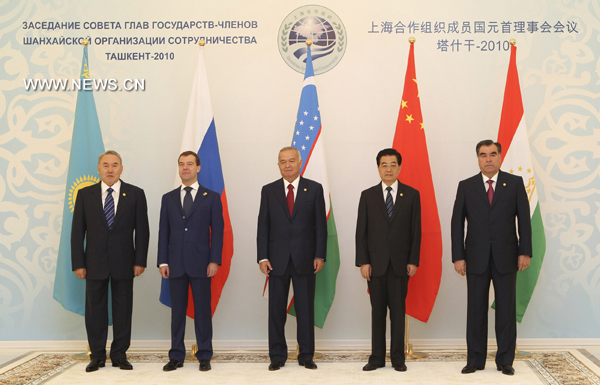Hu attends SCO summit in Tashkent
Chinese President Hu Jintao and leaders of other Shanghai Cooperation Organization (SCO) member states met in the Uzbek capital of Tashkent Friday to work out strategies to meet the security and economic challenges facing the region.
 |
|
SCO member leaders take a photo at the 10th SCO summit in in the Uzbek capital of Tashkent June 11, 2010.? |
President Hu is expected to deliver an important speech at the meeting, calling for deepening pragmatic cooperation among SCO members and safeguarding peace and stability in the region, according to Chinese diplomats.
The theme of the summit is "to strengthen unity and cooperation, maintain stability and pursue common development in the region," said Cheng Guoping, assistant foreign minister of China, at a press conference last week.
He said the Tashkent summit aimed to promote good-neighborly friendship and cooperation, further strengthen political mutual trust, and deepen cooperation in security, economy, culture and other fields between member states.
The leaders were expected to approve a draft document on the terms for admitting new members to the organization, he said.
The draft document was submitted for approval by SCO foreign ministers, who met last month in Tashkent in preparation for the summit.
"Approving this regulation is the first step in forming the basis for expanding SCO membership," Cheng said, noting the regulation would become a cornerstone of the organization's rules on membership expansion.
The organization's procedure rules will also be submitted for approval at the Tashkent summit. The procedure rules are designed to further enhance efficiency and improve the internal mechanisms of the organization.
At the end of the summit, the leaders will issue a declaration to elaborate the SCO member states' joint stand on international and regional issues.
"I believe with the joint efforts of all parties, the Tashkent summit will be a success, and another great event in the history of the SCO," Cheng said.
At last month's meeting in Tashkent, SCO foreign ministers said strengthening stability in Central Asia remained the most important task in the area of secutity.
SCO members would expand cooperation in fighting terrorism, separatism and extremism, the illegal drug trade and organized transnational crime, they said.
Chinese Foreign Minister Yang Jiechi told that meeting the member states should boost security cooperation to safeguard regional stability, including stepping up the fight against terrorism, separatism and extremism, optimizing the model for cooperation in ensuring security for major international events, and carrying on joint anti-terrorism exercises.
Yang also called for better links among the SCO member states, boosting infrastructural construction, further facilitating trade and investment and expanding cooperation in sectors such as finance, transport, energy, telecommunications and agriculture amid the economic downturn.
Founded in 2001, the SCO consists of China, Russia, Kazakhstan, Kyrgyzstan, Tajikistan and Uzbekistan. Mongolia, India, Pakistan and Iran are observers.
 0
0 






